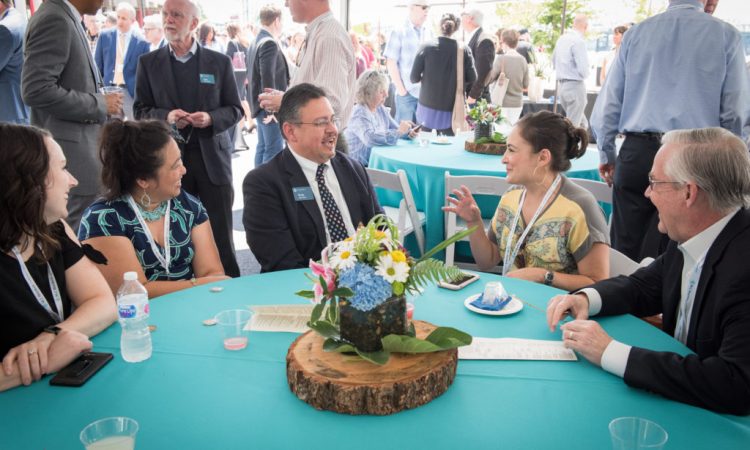
A critical building block of any relationship is physical proximity. By meeting face to face with partners in your community, you increase the likelihood of forming impactful relationships that can help lift your organization and community. But in this age of virtual meetings and conference calls, leaders find themselves with fewer and fewer opportunities for organic collaboration and camaraderie. While Skype, Zoom and similar technologies are convenient for conducting meetings across distance, studies continue to prove there is no true replacement for face-to-face gatherings. One study exhorts the wise business leader to prioritize physical gatherings with this statement: “If face-to-face meetings are feasible, [they] should be held as much as possible.”
The work of the Murdock Trust is rooted in the establishment of quality relationships built in a collaborative approach. Insightful discussions bring unique perspectives to the table and help us better understand the issues facing those we serve. A key strategy in this work is the continued investment in fostering strong relationships within the community. One way we encourage face-to-face collaboration is through convenings we host or co-host with partner organizations across a variety of subjects, including scientific research, education, arts and culture, health, human services, development and leadership. Two recent convenings we hosted centered around microenterprise and faith leaders.
Higher Education
A few weeks ago, the Murdock Trust hosted a series of convenings for leaders of private colleges and universities from around the Northwest. More than three dozen Pacific Northwest schools were represented, and the gathering took place over two days here in Vancouver, Washington. These college deans, presidents, trustees, CFOs and other leaders flew in from all around the region and shared their vision, challenges and discoveries from the field. Over the course of several sessions and four shared meals, state lines and sports rivalries blurred as unity developed and progress took place. This time and space of collective thinking connected a group that admitted to often feeling siloed despite their parallel pursuits. The atmosphere of the convening remained energetic as barriers of geography and anonymity fell away, leaving space for shared ideas and experiences, productive problem solving and true community building.
Microenterprise
Another recent convening hosted by the Trust was conducted for leaders in Microenterprise Lending. This is an area on the nonprofit sector that is rapidly growing and improving communities internationally, and we believe it carries the potential for even greater impact. Acting on this vision, 23 microlenders gathered from around our region for conversations about their work. Yet again, the act of physically gathering was overwhelmingly effective. One attendee described the benefit of solidifying “connections that I’ve been meaning to reach out to for years.” We all have lists of people we have been meaning to reach out to, but good intentions for networking and community building are often overrun by the tyranny of the urgent. It is easy to become so absorbed in the daily needs of an organization that collaboration is placed on the back burner and eventually forgotten. Just having the digital contacts and resources for collaboration is not enough; it requires the intentional expenditure of time and space. This is where the magic happens: when people find themselves in a room together and have the chance to engage in the present moment. Here, connections quite literally come to life. The changes in pace and space bring changes in perspective, and progress is inevitable.
No doubt, coordinating face-to-face interaction is more time consuming and logistically demanding for organizations and leaders than the more popular solution of relying exclusively on technology for communication. At the Murdock Trust, we understand that the highest costs and burdens placed on an organization are often the relational opportunities forfeited by easy solutions. In the long-term, the personal connections formed over a lunch buffet will sustain a leader in more meaningful ways than any Zoom call could. It’s a Northwest distinctive that physical togetherness matters, and we are watching its unifying influence multiply across the Pacific Northwest and beyond.







